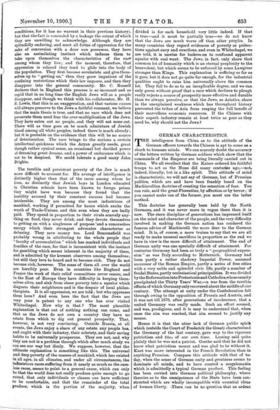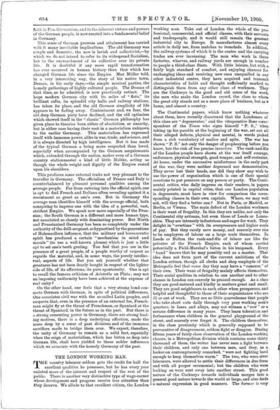GERMAN CHARACTERISTICS.
THE intelligence from China as to the attitude of the German officers towards the Chinese is apt to come as a shock to humane minds. We can scarcely doubt the accuracy of the letters written by German soldiers which show that the commands of the Emperor are being literally carried out in China. We all recollect that the Kaiser ordered his faithful troops to act as the Huns did many centuries ago,ŌĆönot, indeed, literally, but in a like spirit. This attitude of mind is characteristic, we will not say of German, but of Prussian politics, which are and have been frankly based on the Machiavellian doctrine of creating the sensation of fear. You can rule, said the great Florentine, by affection or by terror ;. if you cannot make use of the former, you must use the latter method.
This doctrine has generally been held by the North Germans, and it was never more in vogue there than it is now. The stern discipline of generations has impressed itself on the mind and character of the people, and the very difficulty involved in making the German nation has rendered the famous advice of Machiavelli the more dear to the German mind. It is, of course, a mere truism to say that we are all ready to make unusual sacrifices in proportion as the end we have in view is the more difficult of attainment. The end of German unity was one specially difficult of attainment. For centuries Germany had been as truly a " geographical expres- sion " as was Italy according to Metternich. Germany had been partly a rather shadowy Imperial Power, assumed successor of the Roman Empire, partly a series of free cities with a very noble and splendid civic life, partly a number of feudal States, partly ecclesiastical principalities. It was divided by the Reformation into Protestants and Catholics,whose enmity precipitated the Thirty Years' War,ŌĆöa war from the terrible.- effects of which Germany only recovered about the middle of our century. . The attempt at unity, under the Confederation fell through owing to the opposition of Prussia and Austria, and it was not till 1870, after generations of incoherence, that a united Germany was really made.. Such an effort seemed, and was, prodigious, and it is easy to understand that, when once the aim was reached, that aim seemed to justify any means.
Hence it is that the utter lack of German public spirit which (outside the Court of Frederick the Great) characterised the Germany of the last century, gave way to the vigorous patriotism and CAptc of our own time. Leasing said quite plainly that he was not a patriot. Goethe said that he did not know what patriotism meant and was glad to be without it Kant was more interested in the French Revolution than in anything Prussian. Compare this attitude with that of to- day, when the sense of German unity and greatness seems to dominate all minds, and to have created a megalomania which is admittedly a typical German product. This feeling has been carried into German political philosophy, where theories as to the omnipotence of the State have been con- strated which are wholly incompatible with essential iddas of human liberty. -.There can be no question that an ardent
faith in Pan- Germanism, and in the inherent virtues and powers of the German people, is now erected into a fundamental belief in Germany.
This sense of German prowess and attainment has carried with it many inevitable implications. The old Germany was simple and domestic, the new is lavish and collectivist,ŌĆöby which we do not intend to refer to its widespread Socialism, but to the encroachment of its collective over its private life. It is doubtful if any more rapid transformation has ever occurred in human history than that which has changed German life since the Empire. Max Mfiller told, in a very interesting way, the story of his native town, Dessau, in his early days,ŌĆöthe simple musical parties, the homely gatherings of highly cultured people. The Dessau of that time, as he admitted, is now practically extinct. The huge modern German city with its miles of " flats," its brilliant cafes, its splendid city halls and railway stations, has taken its place, and the old German simplicity of life appears to be fading away. Contentment and, we fear, the old deep German piety have declined, and the old optimism which showed itself in the " classic " German philosophy has given place to theories born either of absolutism or anarchy, but in either case having their root in a materialism unknown to the earlier Germany. This materialism has expressed itself with immense power, alike in war, trade, and science, and it is always directed by high intelligence. But it has made of the typical German a being more respected than loved, especially when accompanied by the German megalomania which, extended through the nation, makes even of a German country stationmaster a kind of little Moltke, acting as though the whole weight and dignity of the Empire rested upon his shoulders.
This produces some external traits not very pleasant to the traveller in Germany. The officialism of France and Italy is counterbalanced by pleasant personal qualities among the average people. Far from entering into the official spirit, one is apt to find French and Italians often revealing against it a resentment as great as one's own. But in Germany the average man identifies himself with the average official, both conspiring to impress one with the idea of a powerful, vast, strident Empire. We speak now more especially of the Prus- sian; the South German is a different and more human type, not associated so closely with dominating power. But North and Prussianised Germany has been so completely under the authority of the drill-sergeant, so hypnotised by the generations of Hohenzollern influence, that the military and bureaucratic spirit has produced a certain "mechanism in mind and morals" (to use a well-known phrase) which is just a little apt to set one's teeth grating. You feel that you are in the presence of a great people, of a people worthy of respect as regards the material, and, in some ways, the purely intellec- tual, aspects of life. But you ask yourself whether that greatness has not been dearly bought in respect of the lighter side of life, of its affections, its pure spontaneity. One is apt to recall the famous criticism of Aristotle on Plato ; may not an imposing uniformity have been achieved at the expense of real unity ?
On the other hand, one feels that a very strong bond con- nects German with German, in spite of political differences. One associates civil war with the so-called Latin peoples, and suspects that, even in the presence of an external foe, French- man might fly at the throat of Frenchman, or Spaniard at the throat of Spaniard, in the future as in the past. But there is a strong cementing power in Germany, there are strong lead- ing motives, there is a deep underlying affection, made the more deep by a sense of past divisions and of the immense sacrifices made to bridge them over. We expect, therefore, the unity of Germany to remain as a solid fact, especially when the reign of materialism, which has bitten so deep into German life, shall have yielded to those nobler influences which we associate with the homely Germany of the past.







































 Previous page
Previous page